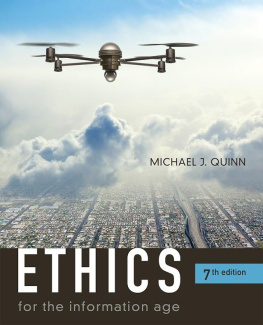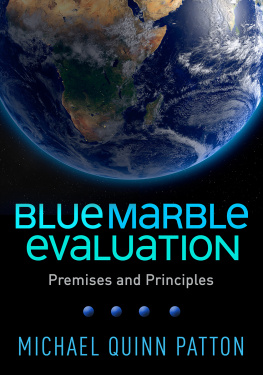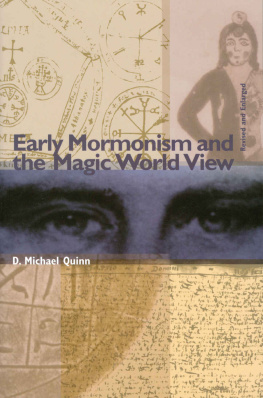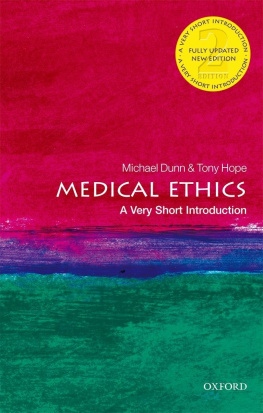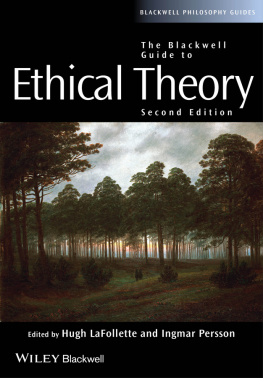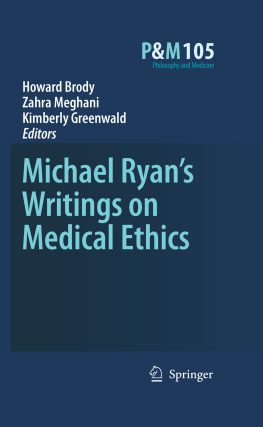Michael J. Quinn - Ethics for the Information Age
Here you can read online Michael J. Quinn - Ethics for the Information Age full text of the book (entire story) in english for free. Download pdf and epub, get meaning, cover and reviews about this ebook. year: 2016, publisher: Pearson, genre: Politics. Description of the work, (preface) as well as reviews are available. Best literature library LitArk.com created for fans of good reading and offers a wide selection of genres:
Romance novel
Science fiction
Adventure
Detective
Science
History
Home and family
Prose
Art
Politics
Computer
Non-fiction
Religion
Business
Children
Humor
Choose a favorite category and find really read worthwhile books. Enjoy immersion in the world of imagination, feel the emotions of the characters or learn something new for yourself, make an fascinating discovery.
- Book:Ethics for the Information Age
- Author:
- Publisher:Pearson
- Genre:
- Year:2016
- Rating:4 / 5
- Favourites:Add to favourites
- Your mark:
- 80
- 1
- 2
- 3
- 4
- 5
Ethics for the Information Age: summary, description and annotation
We offer to read an annotation, description, summary or preface (depends on what the author of the book "Ethics for the Information Age" wrote himself). If you haven't found the necessary information about the book — write in the comments, we will try to find it.
Ethics for the Information Age — read online for free the complete book (whole text) full work
Below is the text of the book, divided by pages. System saving the place of the last page read, allows you to conveniently read the book "Ethics for the Information Age" online for free, without having to search again every time where you left off. Put a bookmark, and you can go to the page where you finished reading at any time.
Font size:
Interval:
Bookmark:

7th edition
7th edition
MICHAEL J. QUINN
Seattle University

Boston Columbus Indianapolis New York San Francisco Hoboken Amsterdam Cape Town Dubai London Madrid Milan Munich Paris Montreal Toronto Delhi Mexico City Sao Paulo Sydney Hong Kong Seoul Singapore Taipei Tokyo
Editorial Director, ECS Marcia Horton
Acquisitions Editor Matt Goldstein
Editorial Assistant Kristy Alaura
Executive Marketing Manager Tim Galligan
Director of Marketing Christy Lesko
Product Marketing Manager Bram van Kempen
Field Marketing Manager Demetrius Hall
Marketing Assistant Jon Bryant
Team Lead Program and Product Management Scott Disanno
Program Manager Carole Snyder
Cover Designer Joyce Consentino Wells
Text Designer Sandra Rigney
Manager, Text Permissions Tim Nicholls
Text Permission Project Manager Maya Gomez
Media Project Manager Renata Butera
Full-Service Project Management Cypress Graphics, Paul C. Anagnostopoulos
Printer/Binder R. R. Donnelley/Harrisonburg
Text Fonts Minion and Nofret
Credits and acknowledgments borrowed from other sources and reproduced, with permission, appear on the appropriate page in the text.
Copyright 2017, 2015, 2013, 2011 Pearson Education, Inc. All rights reserved. Printed in the United States of America. This publication is protected by Copyright, and permission should be obtained from the publisher prior to any prohibited reproduction, storage in a retrieval system, or transmission in any form or by any means, electronic, mechanical, photocopying, recording, or likewise. To obtain permission(s) to use material from this work, please submit a written request to Pearson Education, Inc., Permissions Department, 221 River Street, Hoboken, New Jersey 07030, or you may fax your request to 201-236-3290.
Many of the designations by manufacturers and sellers to distinguish their products are claimed as trademarks. Where those designations appear in this book, and the publisher was aware of a trademark claim, the designations have been printed in initial caps or all caps.
Library of Congress Cataloging-in-Publication Data on file

ISBN 10: 0-13-429654-0
ISBN 13: 978-0-13-429654-8
Computers and high-speed communication networks are transforming our world. These technologies have brought us many benefits, but they have also raised many social and ethical concerns. My view is that we ought to approach every new technology in a thoughtful manner, considering not just its short-term benefits, but also how its long-term use will affect our lives. A thoughtful response to information technology requires a basic understanding of its history, an awareness of current information-technology-related issues, and a familiarity with ethics. I have written Ethics for the Information Age with these ends in mind.
Ethics for the Information Age is suitable for college students at all levels. The only prerequisite is some experience using computers and the Internet. The book is appropriate for a stand-alone computers and society or computer ethics course offered by a computer science, business, or philosophy department. It can also be used as a supplemental textbook in a technical course that devotes some time to social and ethical issues related to computing.
As students discuss controversial issues related to information technology, they have the opportunity to learn from one other and improve their critical thinking skills. The provocative questions raised at the end of every chapter, together with dozens of in-class exercises, provide many opportunities for students to express their viewpoints. My hope is that they will get better at evaluating complex issues and defending their conclusions with facts, sound values, and rational arguments.
The most significant change in the seventh edition is the reorganization of , Intellectual Property. The new, improved chapter is organized around six important themes:
Intellectual property is different from tangible property. Trying to apply Lockes theory of property rights to intellectual property is problematic.
Intellectual property is protected by trade secrets, trademarks, service marks, patents, and copyrights.
Governments have attempted to find the proper balance between the interests of creators of intellectual property, who wish to maintain control over their creations, and the interests of the public, which wants to be able to use these creations. The concept of fair use is an example of such a compromise.
The digital representation of intellectual property enables perfect copies to be made. Free copies are widely available, thanks to high-speed Internet connections. Together, these two technological developments have made possible an unprecedented amount of illegal copying, forcing companies selling these products to make doing the right thingobtaining a legal copyas easy as doing the wrong thingobtaining a pirated copy [Christopher Kauffman, private communication].
The concepts of copyright and patent have been extended to computer software, but issuing software patents has been problematic. The arguments for granting intellectual property protection to software are not strong.
Some believe that the current system of intellectual property protection actually inhibits creativity. The open-source movement advocates the distribution of source code to programs. Creative Commons has developed licenses that make it easier for artists, musicians, and writers to use the Internet as a vehicle for stimulating creativity and enhancing collaboration.
The seventh edition also adds new coverage of many important recent developments. Among them are
employers accessing social media to learn more about job candidates
the growth of the gig economy
the right to be forgotten and the European Union court order requiring Google to suppress certain search results
revenge porn
fake online reviews and efforts to filter them out
the debate over whether mashups are a violation of copyright law
breaches of privacy caused by corporations releasing large data sets that were not correctly anonymized
the smartphone patent wars
the Open Internet Order released by the Federal Communications Commission to preserve net neutrality
responses by China and South Korea to the Internet addiction of many of its youth
the use of darknets by criminals, political dissidents, and others
recent US Supreme Court rulings that seem to indicate that software, as a class, is worthy of patent protection
passage of the USA Freedom Act to reform the Patriot Act in light of Edward Snowdens revelations
the emerging power of data brokers
the trend away from using direct-recording electronic voting machines in the United States
Font size:
Interval:
Bookmark:
Similar books «Ethics for the Information Age»
Look at similar books to Ethics for the Information Age. We have selected literature similar in name and meaning in the hope of providing readers with more options to find new, interesting, not yet read works.
Discussion, reviews of the book Ethics for the Information Age and just readers' own opinions. Leave your comments, write what you think about the work, its meaning or the main characters. Specify what exactly you liked and what you didn't like, and why you think so.

